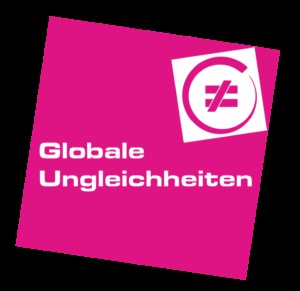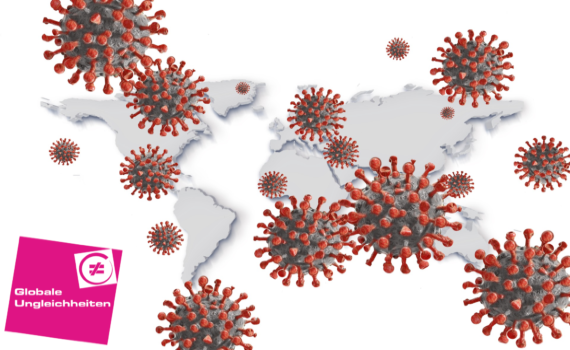The VIDC is co-organiser of #webET2020 and designs the dialogue panel 3) on illicit financial flows and tax justice with speakers from Africa.
The COVID-19 pandemic hasn’t “equalized” anything – despite the fact that some state leaders got the virus, they are not affected in the same way as marginalized people all over the world. In almost every region of the world thus far, the highest numbers of Covid-19 fatalities have occurred in countries where the gap between the rich and poor is the widest. Brazil, the most unequal country in Latin America, has by far the highest number of infected persons. The same applies to South Africa and the United States. There and elsewhere, the link between inequality and high infection rates can be shown right down to the regional and sometimes even local level. The effects of the Covid-19 pandemic come on top of existing inequalities within and between countries. According to Oxfam, “the world’s 2,153 billionaires have more wealth than the 4.6 billion people who make up 60 percent of the planet’s population.” Deepening this gap, the pandemic has left the world more unequal. In addition to its severe health effects and its death toll, we are witnessing a massive increase in unemployment, a pauperization of already precarious and vulnerable parts of the population, and the implementation of partly questionable authoritative measures.
The Covid-19 crisis is causing a social, economic and political crisis of unforeseeable duration. The victims are often already marginalized members of society for whom home office, social distancing or distance learning are not an option or have fatal consequences. There is no question that Covid-19 is further exacerbating global inequalities. Existing imbalances are being reinforced. Even countries in which the number of cases has remained low are today struggling with a decline in foreign investment, a drastic decline of commodity prices, tourism, currencies and migrant remittances, export losses and capital flight of historic proportions. The poorest sections of the population, who have to lead a hand-to-mouth existence, even in “normal times”, suffer hunger and misery caused by the abrupt shutdown of the economy. Moreover, authoritarian regimes are abusing the protective measures against the pandemic to suppress progressive political forces. International human rights organizations report an alarming number of violations of press freedom and attacks on activists.

The #webET2020 discussed the impact of Covid-19 on global inequalities with international guests. In 4 online dialogues a closer look at individual world regions was taken, as the dynamics here are very different.
Dates and details of the 4 online dialogues:
Online dialogue 1) Asia/India: between rising COVID19-infections, shrinking economy and authoritarian politics.
Fri. November 13, 2020, 10:00-12:00 a.m (Austrian time)
Online dialgue with speakers* from/about Asia (Jayati Ghosh, Shalini Randeria, Venkat Ramnayya)
Language: English
More info.
Online dialogue 2) Latin America/Brazil and Peru: is COVID 19 deepening or potentially transforming existing inequalities and authoritarianism?
Fri. November 13, 2020, 14:00-16:00 (Austrian time)
Online dialogue with speakers* from/about Latin America (Ivo Lesbaupin, Camila Moreno, Tarcila Rivera-Zea)
Language: Spanish with translation into English
More info.
Online dialogue 3) Africa/Kenya and Uganda: illicit financial flows and tax justice.
Sat. November 14, 2020, 10:00-12:00 a.m (Austrian time)
Online dialogue with speakers* from/about Africa (Attiya Waris, Luckystar Miyandazi, David Kabanda)
Language: English
More info.
Online dialogue 4) A synthesis attempt.
Sat. November 14, 2020, 14:00-16:00 (Austrian time)
Online dialogue with speakers* from/about Asia, Latin America, Africa and Europe (Jayati Ghosh, Ivo Lesbaupin, Luckystar Miyandazi, Dorcas Erskine)
Language: English
More info.
// A joint even of
AG Globale Verantwortung, Mattersburger Kreis für Entwicklungspolitik an den Österr. Univ., Paulo Freire Zentrum, Uni Linz / Abt. Entwicklungsforschung am Institut für Soziologie, appear-Programm, Hochschulkooperationsprogramm der OEZA, Dreikönigsaktion der KJSÖ, Institut für Internationale Entwicklung der Universität Wien, Institut für Politikwissenschaft an der Universität Wien, Institut für Soziale Ökologie (SEC) an der Universität für Bodenkultur Wien, IUFE, Katholische Frauenbewegung, Klimabündnis, KSÖ - Katholische Sozialakademie Österreichs, ÖFSE - Österreichische Forschungsstiftung für Internationale Entwicklung, Vienna Institute for International Dialogue and Cooperation (VIDC), WIDE - Women in Development Europe

